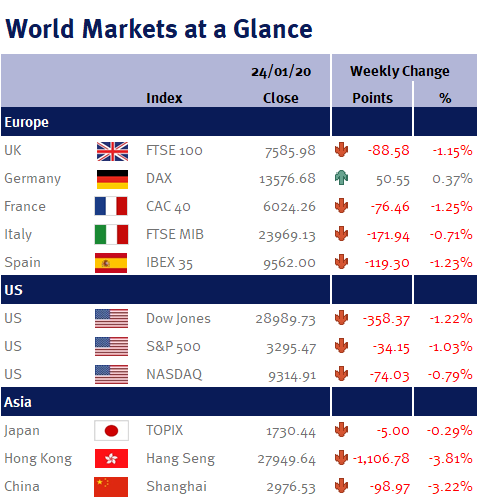It has been an important week for UK data.
Week ending 17th January 2020.
20th January 2020

UK CPI inflation slowed again in December to 1.3% from 1.5% – its lowest rate since November 2016 and well below the BoE’s mandate which is to target inflation at 2%. UK inflation has been trending lower in recent months thanks to the stronger pound (against the US dollar, the pound has risen from $1.20 in August 2019 to $1.30 today (Friday 17 January 2020) – currency strength is disinflationary as it lowers import prices).
Despite widespread discounts and offers in the run up to Christmas, UK consumers clearly decided to tighten their belts as UK retail sales fell 0.6%. This now means that retail sales have fallen or stagnated in each of the past five months (the longest run without growth since records began in 1996).
UK GDP contracted by 0.3% during November 2019. While monthly GDP figures can be volatile, especially given election and Brexit uncertainty, this reading means that Q4 GDP will, at best, stagnate as December’s GDP now needs to grow by around 0.2% in order for the economy to show expansion over the quarter – and that looks unlikely given the role households play in the economy (household expenditure accounts for about 60% of the UK’s economy).
These weak UK data readings confirm to us that UK interest rates should be cut – in fact, regular readers will know that we have long argued that the UK needs lower interest rates (for example please see the Weekly Market Updates for weeks ending 18 October 2019, 21 June 2019 and 3 May 2019), as the economy clearly isn’t booming (business investment is anaemic; industrial production and manufacturing data has disappointed; and the housing market is weakening).
Interestingly, although BoE policymakers were still suggesting that they expected UK interest rates would need to rise following their 19 December 2019 meeting, one policymaker, Gertjan Vlieghe, this week stated that he would be voting for a cut in UK interest rates at the next meeting if key data did not show improvements. Unfortunately, while it finally appears that there is a growing awareness among some of the BoE policymakers that UK interest rates need to be cut, given the next BoE interest rate setting meeting is less than two weeks away (Thursday 30 January 2020), they could still be outvoted by the majority given their mixed recent communications – at least for now!
US equities were among the best performing markets over the week following the signing of the partial trade deal with China, which commits China to do more to crack down on the theft of American technology by Chinese companies.
Additionally, the Fed’s Beige Book showed that the US economy was starting the year on a solid footing after US economic activity expanded “modestly” in the final six weeks of 2019. Furthermore, while headline US CPI inflation rose to 2.3% in December from 2.1%, the Fed has signalled it is open to letting inflation run “hot”, especially as its preferred inflation measure, the core PCE deflator (which excludes volatile items such as food and energy), remains below their 2% target at 1.6%.
Elsewhere, Chinese data signalled that the economy was stabilising. Trade data for December showed exports rose 7.6% (after a drop of 1.3% in November), while imports jumped 16.3% from a paltry 0.3% increase in November. Furthermore, industrial production growth jumped to 6.9%; retail sales were up 8%; and Q4 GDP was steady at 6%.
This week coming members of the World Economic Forum descend on Davos, Switzerland for their annual conference. Additionally we have ECB and BoJ monetary policy meetings; UK employment data (unemployment rate, weekly earnings); and US, UK & Eurozone PMI.
Investment Management Team
The latest market updates are brought to you by Investment Managers & Analysts at Wealth at Work Limited which is a member of the Wealth at Work group of companies.
Links to websites external to those of Wealth at Work Limited (also referred to here as 'we', 'us', 'our' 'ours') will usually contain some content that is not written by us and over which we have no authority and which we do not endorse. Any hyperlinks or references to third party websites are provided for your convenience only. Therefore please be aware that we do not accept responsibility for the content of any third party site(s) except content that is specifically attributed to us or our employees and where we are the authors of such content. Further, we accept no responsibility for any malicious codes (or their consequences) of external sites. Nor do we endorse any organisation or publication to which we link and make no representations about them.

